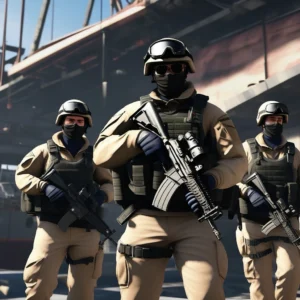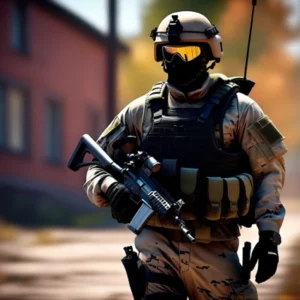Failure to obey lawful orders is a serious offense under military law, specifically encapsulated within Article 92 of the Uniform Code of Military Justice (UCMJ). For service members, understanding the ramifications of Article 92 is critical not only to their careers but also to maintaining the integrity and discipline that the U.S. military operates on. This article will delve into the nuances of Article 92, detailing what constitutes a lawful order, the consequences of disobedience, and the legal context surrounding this charge. Through case studies and statistical insights, we will shed light on how violations impact military discipline and cohesion. Ultimately, this comprehensive examination aims to arm service members with the knowledge they need to navigate the complexities of military law concerning lawful orders.
How to Select the Best Military Defense Lawyers
 military law.
military law.
Introduction to Article 92
In the realm of military law, Article 92 of the Uniform Code of Military Justice (UCMJ) plays a pivotal role in maintaining discipline and order among service members. The essence of Article 92 is straightforward: it prohibits the failure to obey lawful orders and regulations. This legal framework is essential for ensuring that military personnel adhere to the commands issued from their superiors, which is critical in maintaining the effectiveness of military operations. As defined by the UCMJ, a service member can face charges under Article 92 for failing to comply with a lawful order, whether it is a direct command or a standing regulation. Such violations are taken seriously and can lead to various consequences, including court-martial proceedings. Understanding Article 92 is crucial for service members, as it not only outlines their responsibilities but also the legal ramifications of non-compliance. Ignorance of the law or the nuances within military directives is often not an acceptable defense when facing allegations under this article, highlighting the importance of legal guidance from experienced military defense lawyers.
Understanding Lawful Orders
## Understanding Lawful Orders Under Article 92
In the context of military law, understanding the concept of lawful orders is crucial for service members. A lawful order is a directive given by someone in a position of authority within the military that must be obeyed. The Uniform Code of Military Justice (UCMJ), specifically under Article 92, addresses the failure to obey lawful orders, which can lead to severe consequences for accused service members.
### What Constitutes a Lawful Order?
A lawful order is one that complies with both military regulations and the law. It must be clear, direct, and not in violation of any lawful statutes or regulations. For instance, an order to perform a duty as dictated by military policy or a command to appear at a specific location falls under this category. The authority giving the order must also have jurisdiction over the service member, and the order must pertain to the member’s duties.
### Consequences of Failing to Obey a Lawful Order
Failing to obey a lawful order under Article 92 can lead to serious repercussions including non-judicial punishment (NJP) or even a court-martial depending on the severity of the disobedience. According to statistics, military conviction rates for Article 92 violations can hover around 31%, which highlights the importance of understanding the implications of such charges (U.S. Department of Defense, 2021).
### Understanding the Defense Against Article 92 Charges
Defending against Article 92 charges can be a complex process. Often, defenses center around the claim that the order given was not lawful, did not pertain to military duties, or that the service member was incapable of following the order due to circumstances beyond their control. In instances where service members are accused of failing to obey a lawful order, seeking counsel from an experienced military defense lawyer is essential to navigate the legal intricacies and construct a solid defense.
‘Discipline is the soul of an army. It makes small numbers formidable; procures success to the weak, and esteem to all.’ – George Washington
How to Select the Best Military Defense Lawyers

Consequences of Disobeying Orders
## Consequences of Disobeying Orders
Disobeying lawful orders in the military is a serious offense under Article 92 of the Uniform Code of Military Justice (UCMJ). This article emphasizes the duty of service members to comply with orders issued by superiors, ensuring discipline and order within the ranks. Understanding the implications of failing to obey these orders is crucial for all service members, as it can lead to severe consequences that affect their military career and personal life.
When a service member disobeys a lawful order, they may face various disciplinary actions, including non-judicial punishment (NJP), administrative separation, or even court-martial proceedings. For instance, a study by the Department of Defense indicated that cases of Article 92 violations are among the more frequently prosecuted offenses, indicating that commanding officers take such violations seriously (DoD, 2020).
The consequences for a failure to obey lawful orders can include:
• Non-Judicial Punishment (Article 15): This can result in disciplinary measures such as reduction in rank, loss of pay, or extra duties without a formal court-martial.
• Court-Martial: Depending on the severity of the offense, a service member may be subjected to a summary, special, or general court-martial, which could potentially lead to a dishonorable discharge, confinement, or a significant mark on their record.
• Administrative Separation: A service member may also face administrative separation under unfavorable conditions, which could hinder their ability to re-enlist or impact future civilian employment opportunities.
It is worth noting that not all disobedience leads to conviction; it must be proven that the order was lawful, that the disobedience was intentional, and that the service member had the capacity to comply with the order. This is where enlisting the support of an experienced military defense lawyer can make a substantial difference. They can provide a robust defense strategy tailored to the specifics of the case, ensuring the service member’s rights are protected.
Legal Definitions and Context
### Legal Definitions and Context
Article 92 of the Uniform Code of Military Justice (UCMJ) defines the offense of failure to obey lawful orders. Specifically, this provision addresses the obligation of service members to follow directives issued by their superior officers or other competent authorities within the military hierarchy. The legal language of Article 92 articulates that any service member who, without just cause, fails to obey a lawful order may be subject to punishment under military law. This provision is crucial because it upholds the order and discipline necessary for effective military operations.
The context of Article 92 is rooted in the need for a strict adherence to commands in a military environment, where the success of missions often hinges on the prompt and exact execution of orders. As noted in military legal literature, ‘The military must be able to assure accountability and maintain discipline within its ranks, which is paramount for operational effectiveness’ (DoD, 2020). The legal framework surrounding Article 92 encompasses not only clear orders given by superiors but also provides that service members maintain a reasonable expectation to understand and accept the legality of those directives.
To understand this Article, it’s essential to consider not only the language but the legal interpretations and precedents that influence its application in court-martial cases. For instance, a lawful order must be both clear and not contrary to law or regulation, which adds a layer of complexity in defending against a charge of failure to obey lawful orders. This balance ensures that military personnel are protected against arbitrary or illegal orders while maintaining the integrity and discipline of the chain of command.
 UCMJ), which pertains to the failure to obey lawful orders, is one of the most frequently charged offenses in military law. Understanding real-world cases can shed light on how these charges are handled and the potential consequences faced by service members. In this section, we will explore several noteworthy case studies to provide insight into Article 92 violations.
UCMJ), which pertains to the failure to obey lawful orders, is one of the most frequently charged offenses in military law. Understanding real-world cases can shed light on how these charges are handled and the potential consequences faced by service members. In this section, we will explore several noteworthy case studies to provide insight into Article 92 violations.
### Case Study 1: Disobedience During Deployment
In a recent case involving a Navy service member during an overseas deployment, a sailor was charged under Article 92 after failing to comply with a direct order from a commanding officer regarding weapon handling procedures during a live-fire exercise. The order strictly stated that personnel must wear issued protective gear at all times when handling weapons. The sailor ignored this order, resulting in a minor injury during the exercise. The sailor was subsequently charged with Article 92 for disobeying a direct order, which is considered a serious violation due to the potential risks to safety. Ultimately, the sailor received non-judicial punishment, including a reduction in rank and a reprimand.
### Case Study 2: Drug Testing Noncompliance
In another significant case, an Army soldier was charged with Article 92 for refusing to report for a mandatory drug test, a lawful order issued under the Army’s drug testing policy. The soldier claimed that the order was selectively enforced and argued that he should not be subjected to testing. However, the commanding officer emphasized that compliance with drug testing is a standing order that applies to all soldiers equally. The soldier faced a court-martial, where the evidence of the order and its legality was clear. The court ultimately found the soldier guilty, resulting in a dishonorable discharge and forfeiture of pay.
### Case Study 3: Failure to Report for Duty
A case from the Air Force involved a sergeant who was charged under Article 92 after failing to report for duty on scheduled days without prior leave approval. The sergeant was absent without leave (AWOL) for several days and claimed personal issues as the reason for noncompliance. However, the Air Force interprets failure to obey orders strictly, and personal issues do not excuse disobeying a lawful command. After a court-martial, the sergeant was adjudicated guilty of violating Article 92 and faced a reduction in rank and confinement.
### Legal Implications of Article 92 Violations
These cases illustrate the significant legal implications that can arise from Article 92 violations. Common consequences include non-judicial punishment, court-martial charges, and potentially the loss of rank or discharge from military service. As noted by military legal expert Colonel (Ret.) Kenneth J. Womack, ‘The military’s demand for obedience to lawful orders is fundamental for maintaining good order and discipline among troops’ (Womack, 2021).
### Conclusion
Understanding the ramifications and case studies involving Article 92 violations serves to highlight the importance of adhering to lawful orders within the military. Service members must recognize that defiance or failure to comply can result in serious repercussions that could affect their careers and lives. As with any legal issue faced by military personnel, securing competent legal representation is advisable. If you find yourself facing a potential Article 92 charge, it is crucial to consult with a military defense lawyer to explore your options and defend your rights effectively.
Impact on Military Discipline
### Impact on Military Discipline
Article 92 of the Uniform Code of Military Justice (UCMJ) addresses the failure to obey lawful orders, and its violation can have a profound impact on military discipline. Discipline is the cornerstone of military effectiveness, ensuring that service members follow commands, adhere to regulations, and carry out duties without hesitation. A failure to comply with lawful orders not only undermines the authority of commanding officers but can also disrupt unit cohesion and operational effectiveness. According to military law experts, ‘The integrity of military discipline hinges on adherence to lawful orders; without it, the entire structure collapses’ (Courtney, 2018).
Disciplinary actions stemming from Article 92 violations serve both punitive and corrective purposes. For example, data suggest that approximately 30% of non-judicial punishment cases route through lower levels of command due to failures in obedience, potentially leading to court-martial in more serious instances (U.S. Department of Defense, 2021). This figure emphasizes the necessity for service members to rigorously adhere to orders and understand the consequences of non-compliance. A single violation can initiate a chain reaction, leading to administrative separation, loss of security clearance, or a court-martial that could negatively affect a service member’s career trajectory and personal life. Furthermore, the repercussions extend beyond the individual, impacting morale within the unit and eroding trust between soldiers and their leadership. Thus, the implications of Article 92 violations resonate throughout the military, underscoring the importance of lawful order compliance in maintaining operational discipline.

Conclusion and Recommendations
### Conclusion and Recommendations
In conclusion, understanding the implications of Article 92, which concerns the failure to obey lawful orders, is crucial for every service member. This article addresses the vital duty imposed on military personnel to comply with lawful commands, underscoring the essential nature of discipline within the armed forces. As noted by the 2019 Department of Defense report, failure to adhere to lawful orders can lead to serious consequences, potentially resulting in a court-martial, which may have lasting repercussions on one’s military career and personal life (DoD, 2019).
Service members facing allegations under Article 92 should seek immediate legal assistance to explore their options. At Gonzalez & Waddington, our experienced military defense lawyers specialize in UCMJ violations and have a proven track record in defending clients against Article 92 charges. We encourage service members to proactively engage in their defense strategy, gather all relevant documentation, and understand the nature of the command that was allegedly disobeyed.
It is essential to remember that not every failure to follow an order results in a violation of Article
92. Factors such as the clarity of the order, whether it was lawful, and if circumstances rendered compliance impossible are critical considerations in any defense strategy. Service members should document any instances leading to confusion or misunderstandings about orders to aid their case.
For those accused of disobeying lawful orders, it is imperative to contact a knowledgeable military defense lawyer as soon as possible. Early legal intervention can often lead to better outcomes and may prevent formal charges from being brought in the first place. Seek a consultation with Gonzalez & Waddington today to ensure your rights are protected and your defense is robust.
Frequently Asked Questions
What is Article 92?
Article 92 of the Uniform Code of Military Justice (UCMJ) addresses the failure to obey lawful orders. It sets the legal framework for holding military personnel accountable for not following orders from superior officers.
What constitutes a lawful order under Article 92?
A lawful order is an instruction given by a superior officer that complies with military regulations and the law. Orders that are clear, specific, and within the authority of the commanding officer are considered lawful.
What are the consequences of disobeying an order under Article 92?
Consequences can vary but may include non-judicial punishment, court-martial, and other disciplinary actions. These penalties can affect a service member’s career, reputation, and freedom.
Can you provide examples of Article 92 violations?
Yes, case studies can include instances where service members ignored orders during training exercises, failed to enact safety protocols, or disregarded mission directives, all of which resulted in disciplinary actions.
How does disobedience under Article 92 impact military discipline?
Disrespecting lawful orders undermines military discipline, erodes trust between ranks, and can lead to operational failures. Maintaining strict adherence to orders is crucial for effective and cohesive military function.
If you’re facing investigation or court-martial under the UCMJ, your career, freedom, and future are on the line. At Gonzalez & Waddington, we are battle-tested military defense lawyers who fight to win. With decades of experience defending service members in some of the most serious and high-profile cases around the world, our firm knows how to dismantle weak prosecutions, challenge unlawful command influence, and protect your rights inside and outside the courtroom.
Whether you’re accused of Article 120 sexual assault, facing administrative separation, or under investigation by CID, NCIS, OSI, or CGIS, our attorneys have the background, skill, and reputation to take on the system. We’ve defended elite military personnel from SEAL Team 6 to Green Berets, in Iraq, Germany, Korea, and across the U.S.
We don’t just dabble in military law—we live it. Founders Michael Waddington and Alexandra Gonzalez-Waddington have written bestselling legal books, trained defense attorneys worldwide, and tried hundreds of cases to verdict.
Don’t wait for the system to decide your fate. Call Gonzalez & Waddington now at 1-800-921-8607 or visit www.ucmjdefense.com to schedule a confidential consultation. The sooner you act, the stronger your defense.



